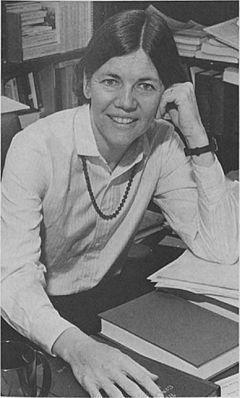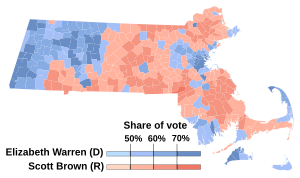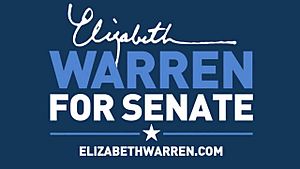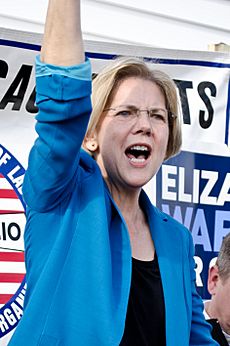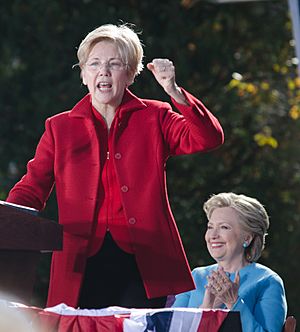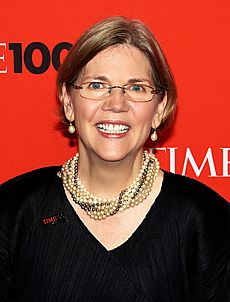Elizabeth Warren facts for kids
Quick facts for kids
Elizabeth Warren
|
|
|---|---|
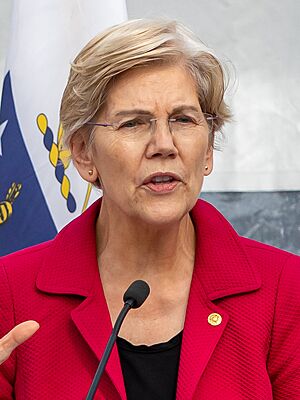
Warren in 2022
|
|
| Ranking Member of the Senate Banking Committee | |
| Assumed office January 3, 2025 |
|
| Preceded by | Tim Scott |
| Vice Chair of the Senate Democratic Caucus | |
| Assumed office January 3, 2017 Serving with Mark Warner
|
|
| Leader | Chuck Schumer |
| Preceded by | Chuck Schumer |
| United States Senator from Massachusetts |
|
| Assumed office January 3, 2013 Serving with Ed Markey
|
|
| Preceded by | Scott Brown |
| Special Advisor for the Consumer Financial Protection Bureau | |
| In office September 17, 2010 – August 1, 2011 |
|
| President | Barack Obama |
| Preceded by | Position established |
| Succeeded by | Raj Date |
| Chair of the Congressional Oversight Panel | |
| In office November 25, 2008 – November 15, 2010 |
|
| Deputy | Damon Silvers |
| Preceded by | Position established |
| Succeeded by | Ted Kaufman |
| Personal details | |
| Born |
Elizabeth Ann Herring
June 22, 1949 Oklahoma City, Oklahoma, U.S. |
| Political party | Democratic (1996–present) |
| Other political affiliations |
Republican (1991–1996) |
| Spouses |
|
| Children | 2, including Amelia |
| Education | George Washington University University of Houston (BS) Rutgers University (JD) |
| Signature | |
| Website | |
Elizabeth Ann Warren (born June 22, 1949) is an American politician and former law professor. She is a United States senator for Massachusetts, serving since 2013. As a member of the Democratic Party, Warren is known for her progressive views. She focuses on protecting consumers, creating fair economic chances, and supporting programs that help people.
Warren grew up in Oklahoma. She studied at the University of Houston and Rutgers Law School. She has taught law at several universities, including Harvard University. Warren has written many books and articles.
Her work in public policy began in 1995. She worked against a law that made it harder for people to declare bankruptcy. In the late 2000s, she became well-known for pushing for stronger rules for banks after the 2008 financial crisis. She led a group that watched over a government program called the Troubled Asset Relief Program (TARP). She also helped create the Consumer Financial Protection Bureau, an agency that protects consumers. She was its first special advisor under President Barack Obama.
In 2012, Warren won against Scott Brown and became the first woman U.S. senator from Massachusetts. She won reelection in 2018 and again in 2024. In 2019, she ran for president in the 2020 United States presidential election. She was a top candidate for a while but ended her campaign in March 2020.
Early Life and Education
Elizabeth Ann Herring was born in Oklahoma City on June 22, 1949. She is the youngest of four children. Her mother, Pauline, was a homemaker, and her father, Donald, was a U.S. Army flight instructor during World War II. Her family was part of the Methodist Church. Warren has said her family was "on the ragged edge of the middle class".
When Warren was 12, her father had a heart attack. This led to many medical bills and less income. To help, her mother found a job at Sears. When Warren was 13, she started working as a waitress at her aunt's restaurant.
Warren was a strong debater at Northwest Classen High School. She won the state high school debating championship. At 16, she won a debate scholarship to George Washington University (GWU). She wanted to be a teacher. In 1968, after two years, she left GWU to marry James Robert "Jim" Warren.
They moved to Houston, where she studied at the University of Houston. She graduated in 1970 with a degree in speech pathology and audiology.
The Warrens then moved to New Jersey. She had their first child, Amelia, and stayed home to care for her. When Amelia was two, Warren started at Rutgers Law School. She earned her law degree in 1976 and passed the bar exam. She had her second child, Alexander, shortly before graduating.
Career
In 1970, before law school, Warren taught children with disabilities for a year. After getting her law degree, she offered legal services from home, like writing wills.
From the late 1970s to the 1990s, Warren taught law at several universities. She also researched bankruptcy and how middle-class families manage their money. In the mid-1990s, she started working on public policy related to bankruptcy and consumer protection.
Academic Work
Warren began teaching at Rutgers University–Newark in 1977. She then taught at the University of Houston Law Center and the University of Texas School of Law. She became a tenured professor at the University of Houston in 1981.
Her early research looked at how laws affect people's finances. She studied court records and interviewed judges, lawyers, and people who filed for bankruptcy. She found that many people filed for bankruptcy not because they spent too much, but because of things like medical bills or trying to buy homes in good school districts. This research changed her views on bankruptcy. She published a book called As We Forgive Our Debtors in 1989 with colleagues.
In 1987, Warren joined the University of Pennsylvania Law School. In 1995, she became a professor at Harvard Law School. She was a very influential law professor, especially in bankruptcy and business law. She was one of the most cited scholars in these fields from 2005 to 2009.
Advisory Roles
In 1995, Warren advised the National Bankruptcy Review Commission. She worked to stop a law that would make it much harder for people to file for bankruptcy. However, this law, the Bankruptcy Abuse Prevention and Consumer Protection Act of 2005, passed in 2005.
From 2006 to 2010, she was part of the FDIC Advisory Committee. She also belongs to the National Bankruptcy Conference, which advises Congress on bankruptcy law. Her work helped lead to the creation of the Consumer Financial Protection Bureau in 2011.
Overseeing TARP
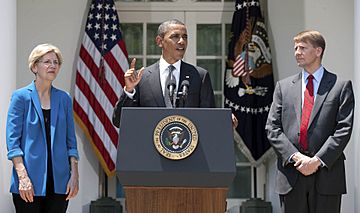
In 2008, Senator Harry Reid asked Warren to lead a five-person panel. This panel was created to watch over the government's bailout program, the Troubled Asset Relief Program (TARP). The panel released monthly reports on how the bailout was working.
Consumer Financial Protection Bureau
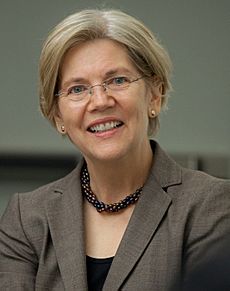
Warren was a strong supporter of creating a new agency to protect consumers financially. This agency, the Consumer Financial Protection Bureau (CFPB), was created in 2010. In September 2010, President Obama asked Warren to help set up the new agency. Many groups wanted her to be the director, but some financial groups and Republicans were against it. Obama later appointed Richard Cordray as the first director.
Political Affiliation
A high school friend said Warren was a "diehard conservative" in high school. She was registered as a Republican from 1991 to 1996. She said she was a Republican because she thought they supported markets best. However, she also said she voted for the Republican presidential candidate only once before 1996.
Warren said she started voting Democratic in 1995. She felt the Republican Party was no longer fair to middle-class families and favored large financial institutions. She believes neither party should dominate.
U.S. Senate (2013–Present)
Elections
2012 Election
On September 14, 2011, Warren announced she would run for the U.S. Senate in Massachusetts. The seat was held by Republican Scott Brown. A week later, a video of Warren speaking went viral. In it, she said that no one gets rich alone. She argued that businesses use roads, educated workers, and police/fire services that everyone pays for. She said successful people should pay their fair share to help the next generation. President Obama later repeated similar ideas in his own campaign.
Warren ran unopposed for the Democratic nomination. She faced strong opposition from business groups. However, she raised a lot of money for her campaign. This showed that it was possible to run against big banks without their money and still win.
At the 2012 Democratic National Convention, Warren spoke about the struggles of the middle class. She said, "People feel like the system is rigged against them. And here's the painful part: They're right. The system is rigged."
2018 Election
On January 6, 2017, Warren announced she would run for a second term as senator. She said she would not "roll over and play dead" while the government worked against working people.
In the 2018 election, Warren won against Republican Geoff Diehl with 60% of the vote.
2024 Election
Warren won a third Senate term in 2024. She defeated Republican John Deaton with 59.6% of the vote.
Time in the Senate
On November 6, 2012, Warren won against Scott Brown. She became the first woman elected to the U.S. Senate from Massachusetts. In December 2012, she was given a seat on the Senate Banking Committee. This committee oversees banking rules. Vice President Joe Biden swore her in on January 3, 2013.
At her first Banking Committee hearing in February 2013, Warren questioned banking regulators. She asked when they last took a Wall Street bank to trial. She said she was worried that banks were "too big to fail" and "too big for trial." Videos of her questions were viewed over a million times.
In May 2013, Warren introduced the Bank on Student Loans Fairness Act. This bill would let students borrow money for education at the same low rate that banks borrow from the government. Senator Bernie Sanders supported her bill.
In early 2015, Warren criticized the Trans-Pacific Partnership, a trade agreement. She argued that it did not protect American workers enough.
In July 2015, Warren, with other senators, reintroduced the 21st Century Glass–Steagall Act. This law aimed to reduce the risk to taxpayers from large banks and prevent future financial crises.
In September 2016, Warren called for the CEO of Wells Fargo, John Stumpf, to resign. She said he should be investigated because Wells Fargo opened millions of fake accounts without customers' permission.
In December 2016, Warren joined the Senate Armed Services Committee. This is a powerful committee that deals with military matters.
In February 2017, during a debate about Senator Jeff Sessions becoming Attorney General, Warren read a letter from Coretta Scott King. King's letter criticized Sessions. Other senators voted that Warren had broken a rule by criticizing another senator. This stopped her from speaking further in the debate. Senate Majority Leader Mitch McConnell said, "She was warned. She was given an explanation. Nevertheless, she persisted." This phrase became a slogan for Warren and her supporters.
In July 2019, Warren and Representative Al Lawson introduced a bill to help low-income college students get food benefits.
In November 2020, Warren was considered for Secretary of the Treasury in the Biden Administration.
Warren was at the Capitol during the January 6 United States Capitol attack in 2021. She called it an "attempted coup" and an "act of insurrection." She called for President Trump's removal from office.
In 2024 and 2025, Warren supported the IRS Direct File program, which helps people file their taxes directly with the IRS.
Role in the 2016 Presidential Election
Before the 2016 United States presidential election, some people wanted Warren to run for president. However, she said she would not. In October 2013, she and other Democratic women senators encouraged Hillary Clinton to run. There was talk that Warren might be Clinton's vice-presidential candidate.
On June 9, 2016, Warren officially supported Clinton for president. She said she was ready to be vice president, but she was not being considered. Clinton later chose Tim Kaine as her running mate.
Warren was neutral during the Democratic primary until June. She then campaigned for Clinton. She called Donald Trump, the Republican candidate, dishonest and uncaring.
Committee Assignments
Warren serves on several important Senate committees:
- Committee on Armed Services
- Subcommittee on Personnel (Ranking Member)
- Committee on Banking, Housing, and Urban Affairs (Ranking Member)
- Committee on Finance
- Special Committee on Aging
2020 Presidential Campaign
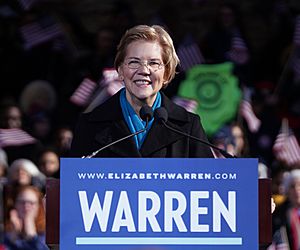
On September 29, 2018, Warren said she would "take a hard look" at running for president in 2020. On December 31, 2018, she announced she was forming a committee to explore a presidential run.
On February 9, 2019, Warren officially announced her candidacy at a rally in Lawrence, Massachusetts. She criticized President Trump, calling him a "symptom of a larger problem" of a "rigged system" that helps the rich and powerful.
Warren became known for her many detailed policy proposals. These included plans to help family farms, reduce student loan debt, offer free tuition at public colleges, and make large companies pay more taxes. One of her main ideas was a "wealth tax" on fortunes over $50 million. The phrase "I have a plan for that" became a popular saying for her campaign.
After a debate in February 2020, Warren received a lot of attention for criticizing fellow candidate Michael Bloomberg. She questioned his tax records and past claims of sexism.
After losing several primary elections, including in Massachusetts, Warren ended her campaign on March 5, 2020.
Polls and Funding
In early June 2019, Warren was second in some polls, behind Joe Biden. Her poll numbers grew, and in September, an Iowa poll showed her in the lead.
In October 2019, a Quinnipiac poll placed Warren in the lead. Many people thought she had the best policy ideas.
Warren said her campaign did not accept money from special interest groups (PACs). She also said she would not accept large donations from executives at banks, big tech companies, or other specific industries. Her campaign raised a lot of money from small online donations.

Warren attended many town halls during her campaign. She was known for staying afterward to talk with people and take many selfies. In September 2019, over 20,000 people attended a rally for her in New York City.
Vice-Presidential Speculation
In June 2020, CNN reported that Warren was among the top choices for Joe Biden's running mate. Biden later chose Kamala Harris.
Personal Life
Warren divorced her first husband in 1978. Two years later, on July 12, 1980, she married law professor Bruce H. Mann. She kept her first husband's last name. Warren has three grandchildren through her daughter, Amelia.
In April 2020, Warren announced that her oldest brother, Don Reed Herring, had died from COVID-19. In October 2021, she announced her brother, John Herring, had died of cancer.
As of 2019, Warren's net worth was estimated at $12 million. In 2022, she and her husband reported a combined income of $1 million.
Political Positions
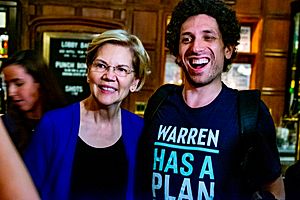
Warren is widely seen as a progressive politician. In 2012, a British magazine named her one of the "top 20 U.S. progressives."
Warren supports workers having a say in company decisions. She wants to break up large companies that have too much power. She also supports stronger punishments for financial crimes. She believes in a "Medicare for All" plan to provide health insurance for everyone and a higher minimum wage.
Warren has often criticized the Trump administration. She raised concerns about Trump's business dealings. She also criticized Trump's immigration policies and called for changes to U.S. Immigration and Customs Enforcement (ICE).
Warren has spoken out against U.S. involvement in the conflict in Yemen. In January 2019, she criticized Trump's decision to remove U.S. troops from Syria and Afghanistan. She agreed troops should leave but wanted a planned withdrawal with allies.
In April 2019, after reading the Mueller report, Warren called for the House of Representatives to begin impeachment proceedings against Trump.
After the Supreme Court overturned Roe v. Wade in June 2022, Warren asked President Biden to use government resources to help with reproductive health services.
In 2022, Warren voted to protect same-sex marriage under federal law.
In March 2023, Warren wrote an article in The New York Times about the collapse of Silicon Valley Bank. She offered ideas to prevent future bank failures.
Warren supports a two-state solution for the Israeli–Palestine conflict. In March 2024, she signed a letter urging the U.S. to recognize a Palestinian state after the war in Gaza.
Warren has also criticized large-scale animal farms, sometimes called "factory farms." She supports stopping the building of new ones and phasing out existing ones by 2040.
Ancestry and Native American Claims
Warren and her brothers have said that family members told them they had some Native American ancestry. In 2012, she said that "being Native American has been part of my story... since the day I was born." In 1984, Warren identified herself as Cherokee in a cookbook. However, Warren is not a member of any Native American tribe.
During her first Senate race in 2012, her opponent, Scott Brown, suggested she made up her Native American ancestry to get job advantages. Warren has denied this. Several colleagues and employers, including Harvard, have said her reported ethnic status did not affect her hiring.
The Washington Post reported that in 1986, Warren identified her race as "American Indian" on a form for statistical information. A 2018 Boston Globe investigation found that her reported ethnicity did not play a role in her academic career. The investigation concluded that "Warren was viewed as a white woman by the hiring committees at every institution that employed her." In February 2019, Warren apologized for identifying as Native American.
President Donald Trump often mocked Warren for her claims of Native American ancestry. In October 2018, Warren released a DNA test analysis. It found her ancestry was mostly European but supported the idea of a Native American ancestor several generations ago. The Cherokee Nation criticized Warren, saying that using a DNA test to claim a connection to a tribe is "inappropriate and wrong."
In January 2019, Warren said, "I am not a person of color; I am not a citizen of a tribe." She said that tribes decide who their citizens are, not DNA tests. She later apologized to the Cherokee Nation for causing confusion. She apologized again in August 2019 at a Native American Forum.
In February 2019, Warren received a standing ovation at a Native American conference. Representative Deb Haaland, one of the first Native American women elected to Congress, introduced her. Haaland supported Warren for president.
Honors and Awards
In 2009, The Boston Globe named Warren the Bostonian of the Year. She also received the Lelia J. Robinson Award. The National Law Journal has named Warren one of the most influential women attorneys in America. In 2009, she became the first professor at Harvard to win the law school's Sacks–Freund Teaching Award twice.
In 2011, she gave the commencement speech at Rutgers Law School, her alma mater. She also received an honorary law degree. In 2011, Warren was inducted into the Oklahoma Hall of Fame. New Statesman magazine named her one of the "top 20 U.S. progressives" in 2012. Time magazine included her in its 100 Most Influential People in the World list in 2009, 2010, 2015, and 2017.
In 2018, the theme for Women's History Month in the U.S. was "Nevertheless, She Persisted." This referred to Senator McConnell's remark about Warren.
Political Influence
Influence on National Politics
Warren is seen as a leader for progressive ideas in the U.S. She has been described as a "liberal standard-bearer." Joshua Green, a writer, says Warren helped shape the Democratic Party to be more left-leaning after the 2008 financial crisis. He says she showed a new way for politicians to fight for their beliefs and get public support. Warren has even said she was a "thorn" to the Obama administration, meaning she was willing to disagree with them publicly.
Journalist Brian Stelter agrees that Warren, along with Bernie Sanders, helped lead an economic "backlash" after the 2008 crisis. This pushed the Democratic Party more to the left. After Donald Trump became president in 2016, many saw Warren as a key leader for the Democratic Party.
Some writers have said that Warren's ideas from her presidential campaign have influenced President Biden's plans. During the Biden administration, Warren has continued to be an important voice in her party.
Mentorship
Warren has mentored several people who later held important political jobs. U.S. Representative Katie Porter was her former law student and helped lead Warren's presidential campaign. Michelle Wu, the mayor of Boston, was also her law student and worked on her 2012 Senate campaign. Suffolk County Sheriff Steven W. Tompkins also started in politics working on Warren's 2012 campaign. Former U.S. Representative Joe Kennedy III considered Warren a mentor during his law school studies. Boston City Council president Ruthzee Louijeune also worked on Warren's presidential campaign.
Influence on Appointments
Warren believes that who a president appoints to their team shapes their policies. She has influenced Presidents Obama and Biden, and Hillary Clinton, on who they should appoint.
Pressuring Hillary Clinton
Warren quietly worked to influence who Hillary Clinton would appoint if she won the 2016 election. She wanted Clinton to promise not to appoint people who were too friendly with Wall Street. Warren and her team also had an unofficial list of Clinton allies they would oppose if they were nominated for jobs.
Warren also sent Clinton a list of people to consult on economic policy. These people had criticized the Obama administration's response to the 2008 financial crisis, like Warren had. Clinton and her advisors listened to Warren's advice. This was partly because they worried Warren might challenge Clinton in the primary. It was also because Warren had strong support among progressives.
Biden Administration
Warren has been successful in influencing President Biden's appointments. Many of her former aides and allies now work in the Biden administration. This includes Bharat Ramamurti, a former economic advisor to Warren, and Sasha Baker, who advised Warren on national security. Within the first three weeks of his presidency, Biden had named four of Warren's former staff members to positions.
In March 2021, a magazine wrote that Warren has been a quiet but constant voice to the Biden administration on who to appoint. Another publication noted that Warren's network in the administration is a victory for the progressive movement. It shows how her "personnel is policy" idea has helped bring more progressive voices into government.
Books and Other Works
In 2004, Warren and her daughter, Amelia Tyagi, wrote The Two-Income Trap: Why Middle-Class Mothers and Fathers Are Going Broke. They argued that even with two incomes, families were struggling. They said that while families spent less on some things, the costs of homes, health care, and child care had gone up a lot. This meant families were saving less and getting into more debt.
A review in The New York Times said the book showed how little attention the government paid to how Americans truly live.
In 2005, Warren and David Himmelstein published a study on bankruptcy and medical bills. They found that many families filed for bankruptcy because of serious medical problems, even if they had insurance.
In April 2014, Warren published her book A Fighting Chance. A review said the title referred to a time when even families with little money had a fair chance at the American dream, a time Warren felt was now gone.
In April 2017, Warren published her 11th book, This Fight Is Our Fight: The Battle to Save America's Middle Class. In it, she discusses the challenges faced by the American middle class. She argues that the government needs to do more to help working families with stronger social programs and more investment in education.
- Publications
|
|
See also
 In Spanish: Elizabeth Warren para niños
In Spanish: Elizabeth Warren para niños
 | Madam C. J. Walker |
 | Janet Emerson Bashen |
 | Annie Turnbo Malone |
 | Maggie L. Walker |



